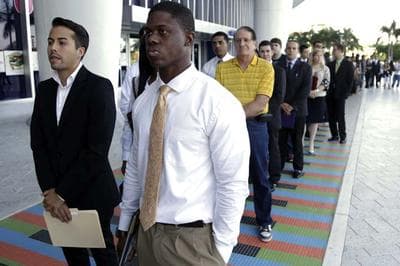Advertisement
The High-Tech Hiring Market Of Today
ResumeThey see you when you’re sleeping. They know when you’re awake. Employers move to digital assessment in hiring, firing and promotion. We’ll check in.

Old-school hiring and promotion could boil down to some pretty basic stereotypes. A firm handshake and a go-getter attitude. New-school hiring and promotion looks a lot more like baseball’s Moneyball approach. Show me the stats. Never mind the handshake, maybe even the job interview. Show me the data. The proof of performance. The statistical indicators that this person will succeed at the job. Big data is all around us now. We understand it and its consequences in the realm of credit scores. You may soon have a number on your “hirability.” This hour On Point: the data-driven hire.
-- Tom Ashbrook
Guests
Don Peck, deputy editor of The Atlantic Magazine. Author of "Pinched: How The Great Recession Has Narrowed Our Futures And What We Can Do About It."
Teri Morse, vice president of Human Resources and recruiting at Xerox Services.
Guy Halfteck, founder and CEO of Knack, a technology-startup that uses gaming to understand and analyze potential. (@GotKnack)
From Tom's Reading List
The Atlantic: They're Watching You at Work — "The application of predictive analytics to people’s careers—an emerging field sometimes called 'people analytics'—is enormously challenging, not to mention ethically fraught. And it can’t help but feel a little creepy. It requires the creation of a vastly larger box score of human performance than one would ever encounter in the sports pages, or that has ever been dreamed up before. To some degree, the endeavor touches on the deepest of human mysteries: how we grow, whether we flourish, what we become. Most companies are just beginning to explore the possibilities. But make no mistake: during the next five to 10 years, new models will be created, and new experiments run, on a very large scale."
Wall Street Journal: Meet the New Boss: Big Data — "For more and more companies, the hiring boss is an algorithm. The factors they consider are different than what applicants have come to expect. Jobs that were once filled on the basis of work history and interviews are left to personality tests and data analysis, as employers aim for more than just a hunch that a person will do the job well. Under pressure to cut costs and boost productivity, employers are trying to predict specific outcomes, such as whether a prospective hire will quit too soon, file disability claims or steal."
The Economist: Robot recruiters — "The problem with human-resource managers is that they are human. They have biases; they make mistakes. But with better tools, they can make better hiring decisions, say advocates of 'big data.' Software that crunches piles of information can spot things that may not be apparent to the naked eye. In the case of hiring American workers who toil by the hour, number-crunching has uncovered some surprising correlations."
This program aired on December 3, 2013.